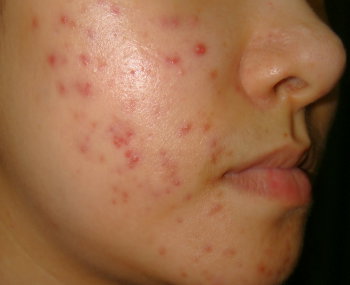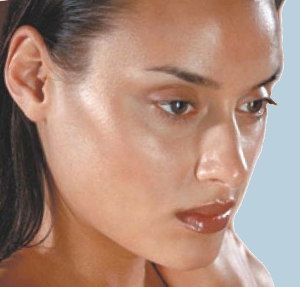We all remember those days from our teenage years – acne is a horrible affliction.

It’s most definitely NOT the end of the world, as we know as mature sensible adults. But darn if it doesn’t feel like it when you’re 13 (or even younger) and your face just starts to break out in hideous red sores and pussy nastiness. Right when you’re becoming highly conscious of the way you look too! Isn’t life cruel sometimes.
So my daughter was one of those teenagers who was hit moderately by acne. Certainly nothing severe, but enough to cause her a lot of upset, and I totally get that too, despite the inner me wanting to say “don’t worry, it will all go away in a few years”..! I fought that back because a few years really is a lifetime when you’re that age, so that won’t help anyone.
Instead I went on a quest to find some kind of solution for her. After all, acne treatments have come a long way since we were young, haven’t they..?
Well, the marketing certainly has, as has the sheer volume of products for sale. But the more I look into them, the more I realised they were very much of a muchness despite the clever branding.
We tried a few, they helped a bit, they cost a lot. Not very satisfying really. At least we were taking action which made daughter at least feel a bit better.
Information is what I wanted most of all, and being a bit of an optimistic hippy type I was convinced there was an inner solution to all this. It’s just the body getting out of sync right?
So, long story short, I found a book. It’s called Acne No More (great title) by a guy called Mike Walden – a Certified Nutrition Specialist. He fixed his 7 years of acne, and my what an information overload! So does acne no more really work? I don’t know if it works for everyone, but it definitely works amazingly for some people. It also helps you avoid a lot of the nonsense and marketing hype too.
It certainly came as a surprise to me that there are vitamins for acne control – I mean, they didn’t tell us that when I was a teenager!
Daughter is much happier now. She also feels she understands acne a lot better too, and has even been helping out her friends with advice to improve their acne.

 No one likes it when their face gets oily. It can clog up pores, and cause pimples and other blemishes. But how can you make sure that doesn’t happen? Luckily, there’s a few simple, easy things you can do to help make sure you avoid those annoying skin blemishes.
No one likes it when their face gets oily. It can clog up pores, and cause pimples and other blemishes. But how can you make sure that doesn’t happen? Luckily, there’s a few simple, easy things you can do to help make sure you avoid those annoying skin blemishes. We now live in an age where we are surrounded by technology no matter where we go. Even when we get inside a vehicle these days it can have LCD screens, which emit low level radiation, and Bluetooth which transmits over the airwaves. Both of these have shown themselves over the years to be pretty safe, even if you spent your whole life sitting in front of an LCD screen it would be unlikely to be a health risk (except for the lack of exercise, and no, I’m not recommending it!).
We now live in an age where we are surrounded by technology no matter where we go. Even when we get inside a vehicle these days it can have LCD screens, which emit low level radiation, and Bluetooth which transmits over the airwaves. Both of these have shown themselves over the years to be pretty safe, even if you spent your whole life sitting in front of an LCD screen it would be unlikely to be a health risk (except for the lack of exercise, and no, I’m not recommending it!).